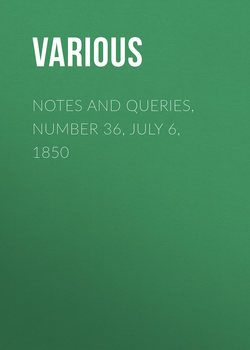Читать книгу Notes and Queries, Number 36, July 6, 1850 - Various - Страница 2
NOTES
MORE BORROWED THOUGHTS
ОглавлениеO many are the poets that are sown
By nature men endowed with highest gifts,
The vision and the facility divine,
Yet wanting the accomplishment of verse,
Nor having e'er, as life advanced, been led
by circumstance to take the height,
The measure of themselves, &c.
Wordsworth's Excursion, B. i.
This admired passage has its prototype in the following from the Lettere di Battista Guarini, who points to a thought of similar kind in Dante:—
"O quante nolili ingegni si perdono che riuscerebbe mirabili [in poesia] se dal seguir le inchinazione loro non fossero, ò dà loro appetiti ò da i Padri loro sviati."
Coleridge, in his Bibliographia Literaria, 1st ed., vol. i. p. 28., relates a story of some one who desired to be introduced to him, but hesitated because he asserted that he had written an epigram on "The Ancient Mariner," which Coleridge had himself written and inserted in The Morning Post, to this effect:—
"Your poem must eternal be
Dear Sir! it cannot fail;
For 'tis incomprehensible,
And without head or tail."
This was, however, only a Gadshill robbery,—stealing stolen goods. The following epigram is said to be by Mr. Hole, in a MS. collection made by Spence (penes me), and it appeared first in print in Terræ Filius, from whence Dr. Salter copied it in his Confusion worse Confounded, p. 88:—
"Thy verses are eternal, O my friend!
For he who reads them, reads them to no end."
In The Crypt, a periodical published by the late Rev. P. Hall, vol. i. p. 30., I find the following attributed to Coleridge, but I know not on what authority, as it does not appear among his collected poems:—
JOB'S LUCK, BY S. T. COLERIDGE, ESQ
"Sly Beelzebub took all occasions
To try Job's constancy and patience;
He took his honours, took his health,
He took his children, took his wealth,
His camels, horses, asses, cows,—
Still the sly devil did not take his spouse.
"But heav'n, that brings out good from evil,
And likes to disappoint the devil,
Had predetermined to restore
Two-fold of all Job had before,
His children, camels, asses, cows,—
Short-sighted devil, not to take his spouse."
This is merely an amplified version of the 199th epigram of the 3d Book of Owen:
"Divitias Jobo, sobolemque, ipsamque salutem
Abstulit (hoc Domino non prohibens) Satan.
Omnibus ablatis, miserò, tamen una superstes,
Quae magis afflictum redderet, uxor erat."
Of this there are several imitations in French, three of which are given in the Epigrammes Choisies d'Owen, par M. de Kerivalant, published by Labouisse at Lyons in 1819.
S.W. SINGER.
Mickleham, 1850.
